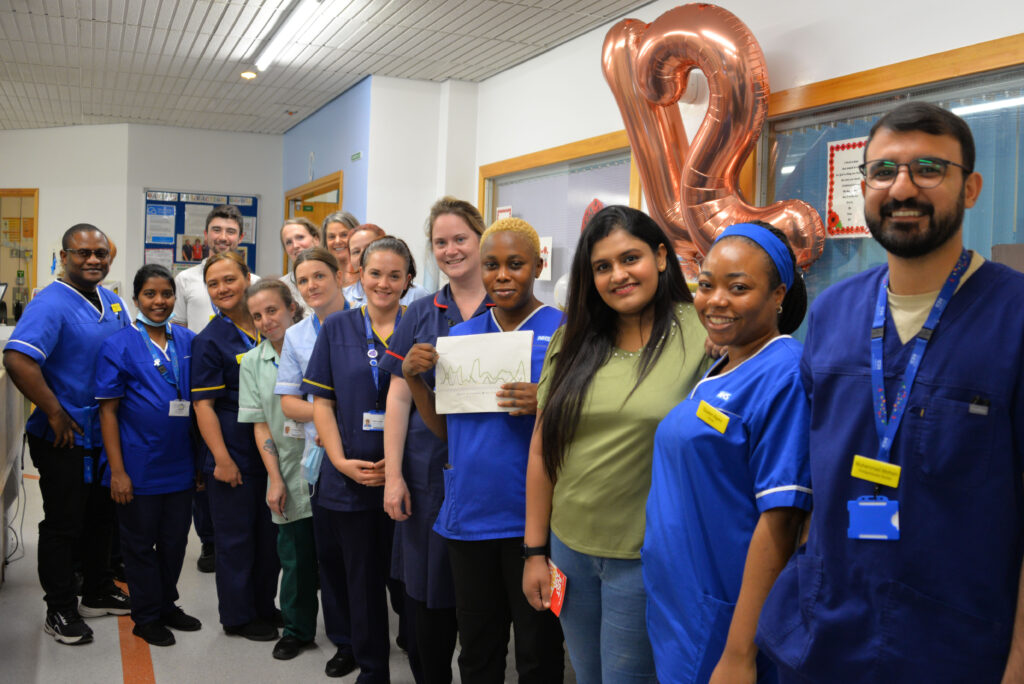
When an elderly or frail patient experiences a fall, it can have devastating
consequences that they may never fully recover from.
It’s never possible to prevent every fall of course, but there are measures that can be
put in place to reduce the chances of it happening…and that’s just what colleagues
on Eliot ward at Musgrove Park Hospital have done, with some really positive
results.
In fact, Eliot ward has recently celebrated having zero falls that caused an injury over
a whole 12 month period – an incredible feat.
It’s all thanks to a falls improvement project that began in 2022 after a number of
elderly patients experienced a fall with injury on the ward during the year before.
There are different levels of falls on hospital wards, from those resulting in no injury
whatsoever, to a potentially debilitating fracture or head injury that may mean the
patient needs emergency surgery.
In addition to having zero falls with injury over 12 months, the Eliot ward team has
also reduced the number of falls without injury from around 15-20 to fewer than five.
Vicki Burgess, Eliot’s ward sister, explains how a different style of nursing greatly
helped to reduce falls on the ward.
“We’re so pleased that the hard work of our falls improvement has translated into a
massive reduction in falls on the ward over the last year,” she says.
“One of the ways that we’ve achieved this was by extending our so-called ‘bay
nursing’, where we always have at least one healthcare assistant or nurse with a bay
of patients at one time – day or night.
“It’s very much a tag team approach and means we’re able to spot a patient who
looks unsteady on their feet, so we can give them the support they need to get about
on the ward, such as if they need the toilet.
“Bay nursing is now very much business as usual on the ward, and we’ve clearly
seen the benefit with such a huge reduction in patient falls.
“Quite a lot of falls tend to happen at night, so we changed the structure of our
colleagues’ break times, and we also undertook a programme of colleague education
to reinforce the importance of someone being in the bay at all times.
“We always highlight patients at high risk of falling during
our safety briefing in the morning, and we also catch up between each shift to
reinforce our knowledge of our patients so we can be more alert.
“For example, we may know that D-bay is a bit of a falls hotspot today, so we’d likely
deploy additional colleagues in that bay.
“We’ve also taken part in group training days with our consultants, who’ve talked
about the certain medications, or changes in blood pressure to look out for, that
could mean a patient is more likely to fall.”
Mel Smith, a staff nurse on Eliot ward, also played a lead role in the falls
improvement project.
“The work we’ve done to reduce falls has been reassuring for relatives, as although
it’s not possible for one-to-one nursing, they’re happier in the knowledge that we’ll
always have a colleague based within their loved one’s bay,” she says.
“We know it’s impossible to prevent all falls as we do want our patients to be up,
dressed and mobilised when in hospital to give them a better chance of recovering.
“As a nurse it’s natural to feel guilty if a patient under our care has fallen, but if we
can do everything we can to prevent this from happening then we are doing our best
for patients.
“For example, even if we’re behind a curtain attending to another patient, it’s still
possible to sense if another patient is trying to get up and about, but is likely to
struggle with their mobility.
“On Eliot ward we predominantly care for elderly patients, many of who are likely to
have dementia or other cognitive issues, so they’re at a much greater risk of falling.
Therefore, even if we witness a fall that can be a good thing, as we’re more likely to
know the severity and can deal with it appropriately.
“So now, even if both nurses in the bay need to go somewhere, they’ll tell the doctor,
physiotherapist, or other colleague, so they can provide cover for a short time –
we’re all part of the team.”
